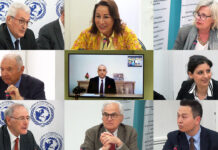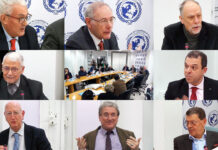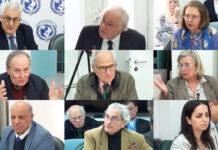Bodil VALERO, Députée Verts/ALE, membre de la Sous-commission sécurité et défense et membre suppléante de la Commission des affaires étrangères.
I come from Sweden, we have to … we are trying to understand why member-States
still send arms to Saudi Arabia, we have to go back before the Arab Spring. As I say, I
come from Sweden … Sweden has the common position on arms export, that is for all
the countries in Europe, we are obliged to follow it, but then we have also our
national legislations.
And the Swedish legislation on arms exports is stricter than the common position. I
will explain more about that later.
Before the Arab Spring, we can say that all countries in Europe felt there was a big
market in the Middle East, especially Saudi Arabia, they are investing very much in all
of our countries’ products, and all the countries wanted to be the one who could sell
the most. All have big arms industries, there’s a lot of job creation in the arms
industries, and all the countries wanted to compete about this big market. And of
course if you follow the common position strictly, you cannot sell to a country that
does not respect human rights. But you couldn’t sell all kinds of material, because if
you can use the material, you want the military equipment that you want to sell
against your own population, to oppress your own population, then it’s not ok with
the common position. But if you cannot use it against your own population, yes you
can, so if you send some marines to Saudi Arabia that’s perfectly ok with the common
position. But if you sell serious equipment for example, then that’s another story.
But in Sweden we have another point of view. To start with, our legislation is to
forbid all kinds of arms exports. So there is a prohibition, as a base. But then you can
do it if it’s in the interest of the Swedish defense, for the Swedish security policy, and
not against the Swedish foreign affairs policy. And our foreign affairs policy is based
on human rights, democracy, and so on. So for us it was not allowed to sell to Saudi
Arabia, according to our national law. But our authorities, they try all the time to
circumvent, and they try to be closer to the common position: “Well, the other ones
they do it, so why should’nt we?”
Then there was a big scandal once, as they couldn’t sell, in reality, anything, they
tried to do a de-selling service to Saudi Arabia. The service was to make an arms
factory in Saudi Arabia, to produce their own arms. Public opinion got to know about
this, because the media was very on and very hot on the issue, and they understood
“Something is going on!”. And because of that big scandal the government decided to
put a committee with all the parties representing the Swedish in Parliament in that
committee … to make the already strict law even stricter, so this could not be
possible again, and it would also include services. But when … I was the one for the
Green Party, in that committee, and when I asked the person responsible, in our
authority that sells arms, how it was possible that we could sell arms to Saudi Arabia
when it was forbidden to start with, and they said “Well, because for the defense
industry, we need to sell because we have a big industry, and they need money … we
need to pay the people working there. So for security interests.” I said: “But for the
security of Sweden, how is it possible that you can say that it’s ok to sell this factory
to Saudi Arabia?” They said: “Well, for the Swedes it’s important to keep the
harbours in Saudi Arabia open … oil transport, and so on.” So that was the security
interest for Sweden.
And then: “But what about human rights and democracy?” And they said: “Well, the
human rights have to stay so back.” And in Sweden we have a country that believes in
women’s rights, and so on, so of course we said “Hey: you are just not complying with
Swedish law at all!”
So now we have the … after three years we had to make a new proposal for a stricter
law, it’s even more strict when it comes to human rights, and before, and it has also
put criteria – specific criteria on democracy, into it. We, when we started this
committee we were in opposition, but in the middle we had the lectures, and the
Greens came to government together with the Social Democrats. And we had also to
renew the memorandum of understanding with Saudi Arabia, and we decided … we
did not renew it. And we did not. That was a big fight with Saudi Arabia in that days
because of course there were … we had a lot of orders already for radar systems and
so on, but of course with the closing of the memorandum of understanding it’s much
more difficult to sell new products to Saudi Arabia.
Now that this law is going to pass the Swedish Parliament, because it has been looked
upon, and if we did everything right and so on, so now we can pass the Parliament
very soon, and we are very happy too … that this is going to be the case. But during
this time, I left the Swedish Parliament, and I came here to the European Parliament,
and as a member of the seller committee, then I got this responsibility to also
produce or to be the reporter for the control of the European exports.
So in 2015 I had my first … again in 2015 we … I presented my first report on the
weapons … the control of the weapons exports, European in general and where I
tried then to get the other groups here in the Parliament, also, telling that we need a
stricter interpretation of the common position, and that was possible because of
what is happening in the [non Middle East and also because we now see also terrorist
attacks in the European Union and they are many times related to the Middle East.
So of course here in the Parliament, we do see the world is changing, and we have to
adapt. The problem is when we come to the counseling, because there we have the
member-States, and they are so stuck in their ways of selling arms, their traditional
ways of selling arms, so we will have a big fight with them. And anyway, the first
report I made, we took one first step, I think in a stricter way. After that, I got a call,
or a letter from the … from Saudi Arabia and they wanted to see me, and as they
know I come from Sweden, they also said: “Well, there is a Women Delegation from
Saudi Arabia coming here, and we would like to see you”, because they thought that
maybe I would say “No!” otherwise. So I met this group, and there was a man and
some women and a lot of other people around them, and the man was talking very
much, until I said: “Well, I also want to hear what the ladies would like to tell me!”
[NDT – rire dans l’assistance]. Well it was a good discussion, and so on, but they … of
course they knew about my position on the exports, they also knew about my
position on the situation in Yemen – we also had a resolution on Yemen in 2015, and
so they told me that: “Yes, we are in … we went to Yemen because this is self-
defense!”. So this was self-defense for Saudi Arabia. Ok we didn’t get along, we didn’t
agree, now this year I’ve had my second … no, after the first report, we had a new
resolution also on Yemen, where we managed to get in also that the Parliament
pronounces itself in favour of an embargo against Saudi Arabia. Because we can do
that, as the Council, to decide upon that. It’s more difficult to use the common
position, especially when it comes to human rights, because of the reasons I told you
before, but that’s what you use the major equipment for.
But anyway, when a country is in war, it’s also forbidden to sell arms … but anyway,
the countries, the member-States they are continuing to sell arms to Saudi Arabia. So
what could the counsel do? Yes, they could have an embargo against Saudi Arabia.
And so this came into the resolution, because of our big work to get it into it, because
not all other groups are in favour of it … [NDT- several incoherent phrases].
I made my second report on the control of weapons export, and there we put it in
again, and we got again the Parliament to stand behind the wish for a weapons
embargo against Saudi Arabia. And now we got fed up, we are going to send a letter
to Rothering again, with several of the group’s party leaders – the other group is in it,
we are in it, the socialists are in it, and the left-wingers they are in, we don’t believe
we get the right-wing parties into that letter, but anyway I believe we will be a
majority in Parliament, asking Mogalili to start the work on the weapons embargo.
This is a long process, it takes a year to change the mentality, and there’s so much
money into this – in weapons export, but at the same time, also in the Commission
[NDT- several incoherent phrases], because we have so much extract of weapons
systems in the European Union, we don’t need it, we have a lot of capacity for
weapons in European Union, and we have to reduce in some way. Before, we should
not so much compete with each other, we should produce what we need for our
common defense, and not just producing to sell to other countries, because that can
also be used against us, because if we sell something to a country somewhere, and
suddenly that country is no longer in peace, then these weapons can be used against
us [NDT- incoherent phrases] … that is why it has been easier to get the Parliament
also to stand behind the embargo, or inspect the control of the weapons.
We have a long way to go still, but we are on the way, and I think that we in the
Parliament we are leading this time. The Parliament in the European Union is some
member-States, as Sweden, but where all other member-States gather and they
discuss different ways of interpreting the common position and so forth, and I feel
that many of the member-States they are on our side. So I think it’s not impossible,
but it will be very difficult, especially we have a problem with France, Germany and
Great Britain, those are the biggest problems when it comes to weapons export,
really, for the whole of Europe.
But I can assure you that we will do everything that we can in this Parliament, and
then we also have a very good compilation in the other buildings.







